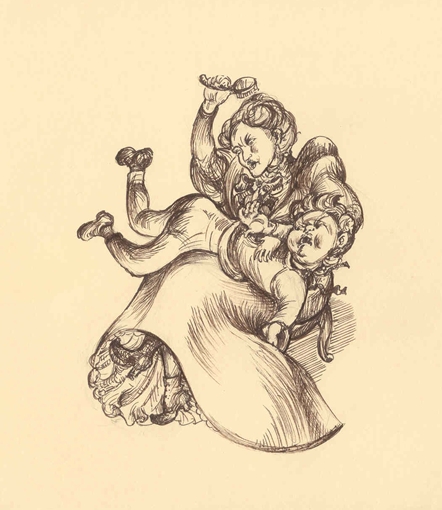To link to this article from your blog or webpage, copy and paste the url below into your blog or homepage.
Shadows Of Forgotten Ancestors
a book by Carl Sagan and Ann Druyan
(our site's book review)
Even female chimps are not born knowing how to be good mothers. They have to be shown, say Sagan and Druyan.

Carl Sagan says we must learn what we can in science and then apply it to making a better society
This book was to have been the first in a series; the next one was to cover man from the dawn of the species up to the invention of civilization. Since Sagan died in 1996, the completion of the series is in question. But the overall gist of this book is that it feels incomplete. The authors looked at the evolutionary, genetic roots of aggressive tendencies in primates. Throughout the book the pattern was repeated of analyses in genetic directions that missed the human sociological factors, which over and over meant missing the most important factors of all, since man is a social creature even more than he is an instinct-driven primate. The missed human sociological factors can be easily inferred by many, but that surely soft-pedals the potential positive impact the book could have.

Man is a social creature even more than he is an instinct-driven primate
But since the book centers on nonhuman primates, sociological factors distinct to humans were not appropriate. What this all adds up to is that the series either will or would have completed the work in such a way as to cover all the bases in a comprehensive manner, but also that this book doesn’t stand alone that well, since many of the questions and issues raised require a human sociological context to resolve. And since these are such profoundly important issues, it feels rather reductionistic to look at this genetic side of the issues only. It’s like trying to solve X = A + B + C when only A is known.
The authors note that the type of monkey that has the most flat-gradient nurturing is the least aggressive. (Macaques in laboratory experiments were exemplary in their moral grounding and their courageous resistance to evil, and they practice flat-gradient nurturing.) Since aggression in mankind is the ultimate issue being alluded to in this uncompleted series (because it’s the key factor in our survivability), it’s interesting that such a key factor is breezed over. One can only hope that subsequent books would correct this oversight, since it points to the most important information of all that we can learn from primates: nurturing style determines personality/character traits as well as levels of security, confidence, positive social contacts and satisfaction.

Macaque
Alternatively, have future printings of Shadows Of Forgotten Ancestors contain an update that deals with what this page is saying. Human flat-gradient nurturing is needed, but steep-gradient nurturing is what almost all humans in advanced nations do. The point of Shadows Of Forgotten Ancestors needs to be how humans can use this flat-gradient nurturing factor to deal with our incredibly strong characteristic of negative aggressiveness. Insightful people can easily infer this from the book, but humans' steep-gradient nurturing is so ingrained in our thoughts, habits, and culture that for this book to do any good, the authors will, unfortunately, need to hit the reader over the head with this critical point, not breeze by it.
For instance, Art Levine’s The Biological Roots of Good Mothering is a milestone in primate studies, giving us the most useful information of all about how primates, including humans (the extrapolation is a no-brainer), experience a direct, causal relationship between abuse and steep-gradient nurturance; the importance of a good, spacious living environment without crowding; the critical impact of good examples to emulate; and the fact that mothering must be taught. In line with the thinking (of Sagan and Druyan in their book) that we must learn what we can in science and then apply it to making a better society, it is curious that Levine’s milestone is nowhere to be found in their book, since it came out a year before Sagan's and Druyan's book was published. To illustrate just how useful such excellent science is, it should be pointed out that the information learned in Levine’s research was directly applied to humans, and the result was a 500% reduction in abuse. Not 50. Five hundred!

Primates, including humans, experience a direct, causal relationship between abuse and steep-gradient nurturance
The authors say that we can’t wait for evolution to select more survivable genetics for ourselves; we need to use our intelligence and transcend any negatively aggressive proclivities; we must create a society that brings out the best in us and that no longer elicits so much of our negative potentials. They say we’re absolutely not condemned to live out our lives in “a barely disguised chimpanzee social order.” We have the ability to change and to transcend any tendencies to revert to primate instincts. Good point. But that is a generality. The specific method of transcendence is begging to be pointed out here. Once again, the point of Shadows Of Forgotten Ancestors needs to be how humans can use this flat-gradient nurturing factor to deal with our incredibly strong characteristic of negative aggressiveness—a point which their book glosses over for mysterious reasons. An oversight? In too big of a hurry to meet a publisher deadline?

The point of Shadows Of Forgotten Ancestors needs to be how humans can use the win-win flat-gradient nurturing factor to deal with our incredibly strong characteristic of negative, win-lose aggressiveness





